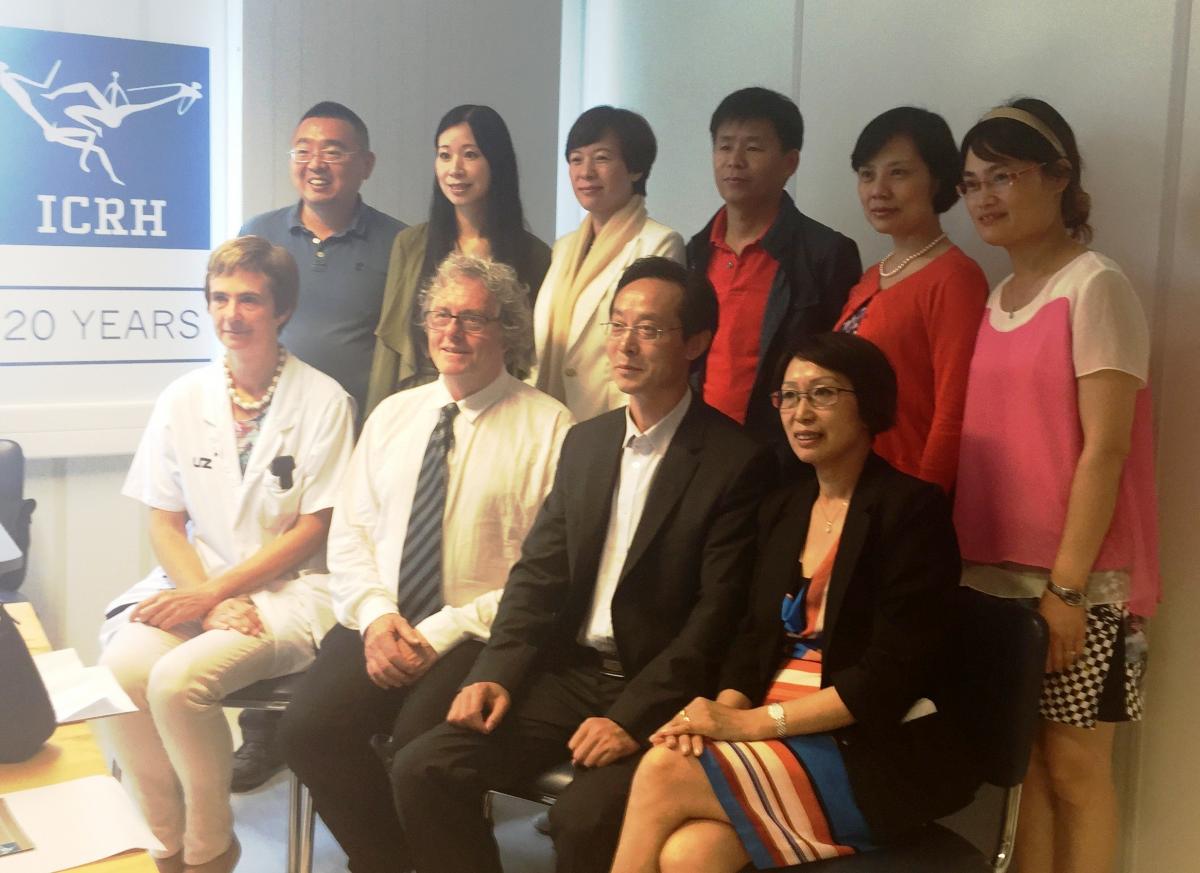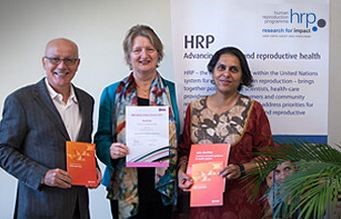Newsletter September 2015
 ICRH Global Newsletter ICRH Global Newsletter 17th of September, 2015
|
| PROJECTS |
Economic empowerment of girls and women in Mozambique |
Global Early Adolescent Study Flanders |
| EVENTS |
| PhD defence Peter Decat On 28 September, Peter Decat will defend his doctoral thesis entitled: ‘Addressing the Unmet Contraceptive Need of Adolescents and Unmarried youth: Act or Interact? Learning from Comprehensive Interventions in China and Latin America’. Worldwide, increasing numbers of young unmarried people and adolescents are at risk of unplanned pregnancy. Such pregnancies entail significant consequences for the well-being of mother and child. In his thesis, Peter describes the results of two intervention studies addressing unmarried people in different regions, namely China and Latin America. In the last chapter he proposes an innovative intervention model that might be complementary to existing approaches for the development of future adolescent sexual health programmes and related research. Promoters are Prof. Olivier Degomme and dr. Kristien Michielsen. You are most welcome to attend the public defence and the reception afterwards in auditorium 1 of Ghent University Hospital (K3, 1st floor, UZ Gent). The defence starts at 5.30 pm. Please confirm your attendance by sending an email to cindy.demuynck@ugent.be. |
Visit Delegation Tsinghua University On 11 August, ICRH Belgium hosted a delegation of Tsinghua University. The delegation was especially interested in the social, medical and practical aspects of elderly care, a topic in which also ICRH is increasingly interested because of its implications for sexual health and well-being. The delegation of Tsinghua University consisted of Zhang Jun (Director of office centre at the Research Center for Public Health), Liu Qingyu (Project Manager at the Research Center for Public Health), Ren Jiehui (Senior Researcher at the Department of Sociology), and was accompanied by representatives of investment companies with an interest in investing in elderly homes in China. Chen Chao (CEO of NEY International Investment Holdings Co Ltd, Tuo Xinyong (Manager of NEY International Investment Holdings Co Ltd), Wang Jiaqi (CEO of Beijing Snow Zhongjin Medicine Biotechnology Co Ltd). ICRH colleagues Zhang Wei-Hong and Dirk Van Braeckel with support from others took care of the hosting. Ghent University geriatrics and ger-ontology professor Nele Van De Noortgate gave a presentation on elderly care in Belgium, followed by a discussion. After that, the delegation paid a visit to the rehabilitation centre of the Ghent Uni-versity Hospital where were welcome and offered guided visit by Prof. Rimbaut Steven and his col-leagues. More information: Weihong.zhang@ugent.be |
Sexual assault reference centres |
Session on adolescent SRH at ECTMIH 2015 At the 9th European Conference of Tropical Medicine and International Health (ECTMIH) in Basel, ICRH convened a special session on Adolescent Sexual and Reproductive Health (ASRH). At the 9th European Conference of Tropical Medicine and International Health (ECTMIH) in Basel, ICRH convened a special session on Adolescent Sexual and Reproductive Health (ASRH).The invited keynote speaker Prof. David Ross (WHO/LSHTM) provided a comprehensive overview of the status of ASRH and the way forward to improve it. Furthermore, the session contained four abstract-driven presentations on the association between sexuality education and disclosure and treatment seeking after sexual violence in Central Africa (Sonja Merten), on adolescents’ perceptions on sexuality in Rwanda (Jana Gerold), on capitals and entitlements in health promotion in Tanzania (Constanze Pfeiffer) and on a web based peer support system to improve ART adherence in Kenya (Olena Ivanova). ICRH Belgium colleague Kristien Michielsen facilitated the session. |
First Prize for safe abortion handbook WHO’s Department of Reproductive Health and Research has been awarded First Prize in the BMA 2015 Medical Book awards in the Obstetrics and Gynaecology category for its publication Clinical practice handbook for safe abortion. The ‘Clinical practice handbook for safe abortion care’ was developed to facilitate the practical application of the clinical recommendations that were published in the second edition of Safe abortion: technical and policy guidance for health systems, in 2012. While legal, regulatory, policy and service-delivery contexts may vary from country to country, the recommendations and best practices described in both of these documents aim to enable evidence-based decision-making with respect to safe abortion care. The BMA Medical Book award review describes the handbook as ‘… concise, relevant and inviting to use with clear, helpful and accurate content’. The Award was presented in London by Professor Sir Al Aynsley-Green Kt, BMA President. The handbook can be downloaded free of charge here. |
| ICRH PEOPLE |
Alex Lucas Since July, Alex Lucas is the new Provincial Coordinator for ICRH-Mozambique in Tete province, replacing John Mkandawire. Since July, Alex Lucas is the new Provincial Coordinator for ICRH-Mozambique in Tete province, replacing John Mkandawire.Alex holds a post-doctorate in Sustainable Development, Health and Environment, Doctorate in Global Health, and Masters in Public Health (University of Barcelona and Atlantic International University). Before joining ICRH-M he worked for various international organizations including PSI, Abt Associates, JSI, Austrian Development Cooperation, AECID, Save the Children and UNDP, as well as the Mozambique Ministry of Health. Alex brings strong experience in the area of programme management and coordination of health projects at various levels, including strengthening health systems, governance and institutional capacity building, as well as research experience. He is motivated in his work by a desire to contribute to improving global health, especially for vulnerable populations. More information: Icrh.coord.tete@tvcabo.co.mz |
Katrien Van Impe Katrien will help ICRH Belgium step up its external communication. Katrien will help ICRH Belgium step up its external communication.After having obtained a bachelor degree in social work, a master’s degree in communication sciences, and finishing a 6-month internship at UNICEF, Katrien had several jobs in the fields of communication and public relations. Since mid-August she is working part-time at ICRH Belgium where she will review the external communication and develop tools to improve it. |
Che Yan Dr Che will work as a postdoctoral researcher at ICRH Belgium. Dr Che will work as a postdoctoral researcher at ICRH Belgium.Yan Che obtained a bachelor and a master degree of medicine at Shanghai Medicial University in China and a PhD in Epidemiology and Public Health at the London School of Hygiene & Tropical Medicine (LSHTM) in the UK. Before moving to ICRH, he has worked at the Shanghai Institute of Planning Parenthood Research. As a Wellcome Trust Postdoctoral Fellow, he worked at LSHTM for a couple of years. As an Asian Fellow of the Asian Scholarship Foundation, he worked at the International Institute for Population Studies in India between 2007 and 2008. Dr Che was involved in more than 30 national (China) and international research projects during his research career, which are mainly focused on family planning, fertility, infertility, abortion, maternal and infant health. He currently works for the INPAC project that is funded under EC FP7-Health. Dr Che has published over 80 peer-reviewed papers and serves as an ad hoc reviewer for scientific journals including the Lancet, Studies in Family Planning, Reproduction & Contraception, etc. |
Kishen Mandalya Kishen is doing a summer internship at ICRH Belgium. Kishen is doing a summer internship at ICRH Belgium.Kishen is a Kenyan national studying mathematics and economics at the London School of Economics and Political Science. Since the beginning of August, he is working at ICRH in Gent on a model to calculate the costs of teenage pregnancies. This model, which is based on a literature study on the topic, will allow to estimate the financial and economic benefits of campaigns and instruments aimed at preventing teenage pregnancies. |
| PUBLICATIONS |
Sexually transmitted co-infections and HIV viral load Antiretroviral therapy (ART) markedly reduces HIV transmission, and testing and treatment programs have been advocated as a method for decreasing transmission at the population level. Little is known, however, about the extent to which sexually transmitted infections (STIs), which increase the HIV infectiousness of untreated individuals, may decrease the effectiveness of treatment as prevention. A systematic review and meta-analysis was undertaken to address this knowledge gap. The authors searched bibliographic databases and identified studies reporting differences in HIV transmission rate or in viral load between individuals on ART who either were or were not co-infected with another STI. Hierarchical Bayesian models were used to estimate viral load differences between individuals with and without STI co-infections. These findings suggest that, on average, STI co-infection is unlikely to decrease the effectiveness of HIV treatment as prevention. However, with currently available data, the possibility cannot be ruled out that certain STI co-infections have larger effects than others. More high-quality studies specifically aimed at investigating the impact of STI co-infection on HIV sexual transmission from individuals on ART are needed. Champredon D, Bellan SE, Delva W, Hunt S, Shi C-F, Smieja M, Dushoff J. The Effect of Sexually Transmitted co-Infections on HIV Viral Load amongst Individuals on Antiretroviral Therapy: A Systematic Review and Meta-Analysis. BMC Infect Dis. 2015;15:249. doi:10.1186/s12879-015-0961-5. |
Sexuality education Holistic sexuality education (HSE) is a new concept in sexuality education (SE). Since it differs from other types of SE in a number of important respects, strategies developed for the evaluation of the latter are not necessarily applicable to HSE. In this paper the authors provide a basis for discussion on how to evaluate HSE. First, the international literature on evaluation of SE in general was reviewed in terms of its applicability to HSE. Second, the European Expert Group on Sexuality Education extensively discussed the requirements of its evaluation and suggested appropriate indicators and methods for evaluating HSE. The European experience in SE is scarcely represented in the general evaluation literature. The majority of the literature focuses on impact and neglects programme and implementation evaluations. Furthermore, the current literature demonstrates that evaluation criteria predominantly focus on the public health impact, while there is not yet a consensus on sexual well-being criteria and aspects of positive sexuality, which are crucial parts of HSE. Finally, experimental designs are still considered the gold standard, yet several of the conditions for their use are not fulfilled in HSE. Realising that a new evaluation framework for HSE is needed, the European expert group initiated its development and agreed upon a number of indicators that provide a starting point for further discussion. Aside from the health impact, the quality of SE programmes and their implementation also deserve attention and should be evaluated. To be applicable to HSE, the evaluation criteria need to cover more than the typical public health aspects. Since they do not register long-term and multi-component characteristics, evaluation methods such as randomised controlled trials are not sufficiently suitable for HSE. The evaluation design should rely on a number of different information sources from mixed methods that are complemented and triangulated to build a plausible case for the effectiveness of SE in general and HSE in particular. Evert Ketting, Minou Friele and Kristien Michielsen; on behalf of the European Expert Group on Sexuality Education. Evaluation of holistic sexuality education: A European expert group consensus agreement.The European Journal of Contraception and Reproductive Health Care, 2015; Early Online: 1–13. |
Between compliance and resistance Although the Mozambican government has implemented a community-based approach to family planning (FP), little is known about the appropriateness of this process. This article explores how members of Community Health Committees (CHCs) address and act regarding family planning. An in-depth qualitative study of CHCs was conducted at two sites in Maputo province -Ndlavela and Boane- using focus group discussions (n=6), informal conversations (n=4) and observation. The analysis followed a phenomenological approach. CHCs in Ndlavela appeared to transfer more of the expected information than those in Boane. However, in the CHCs at both study sites, we found heterogeneity in CHCs’ perspectives leading to conflicting views among committee members (CMs). Arising issues included contraceptive type, target groups, the desirable number of children per family as well as the way FP was to be represented. Moreover, weak communication between CMs and health workers, and lack of payment for CMs’ activities influenced promotion of FP. The authors conclude that the two CHCs framed FP in different ways leading to inconsistent participation of CHC members in promoting FP. Policymakers should consider the diversity of discourses and aspirations of these committees when delivering information to them. Rehana Dauto Capurchande, Gily Coene, Kristien Roelens, Herman Meulemans. Between compliance and resistance: exploring discourses on family planning in Community Health Committees in Mozambique. BMJ Open 2015;5:e006529. doi:10.1136/bmjopen-2014-006529. |
Are Sexual and Reproductive Health Policies Designed for All? Health policies are important instruments for improving population health. However, experience suggests that policies designed for the whole population do not always benefit the most vulnerable. Participation of vulnerable groups in the policy-making process provides an opportunity for them to influence decisions related to their health, and also to exercise their rights. This paper presents the findings from a study that explored how vulnerable groups and principles of human rights are incorporated into national sexual and reproductive health (SRH) policies of 4 selected countries (Spain, Scotland, Republic of Moldova, and Ukraine). It also aimed at discussing the involvement of vulnerable groups in SRH policy development from the perspective of policymakers. Literature review, health policy analysis and 5 semi-structured interviews with policy-makers were carried out in this study. Content analysis of SRH policies was performed using the EquiFrame analytical framework. The study revealed that vulnerable groups and core principles of human rights are differently addressed in SRH policies within 4 studied countries. The opinions of policy-makers on the importance of mentioning vulnerable groups in policy documents and the way they ought to be mentioned varied, but they agreed that a clear definition of vulnerability, practical examples, and evidences on health status of these groups have to be included. In addition, different approaches to vulnerable group’s involvement in policy development were identified during the interviews and the range of obstacles to this process was discussed by respondents. Incorporation of vulnerable groups in the SRH policies and their involvement in policy development were found to be important in addressing SRH of these groups and providing an opportunity for them to advocate for equal access to healthcare and exercise their rights. Future research on this topic should include representatives of vulnerable communities which could help to build a dialogue and present the problem from multiple perspectives. Ivanova O, Dræbel T, Tellier S. Are sexual and reproductive health policies designed for all? Vulnerable groups in policy documents of four European countries and their involvement in policy development. Int J Health Policy Manag. 2015;4(x):x–x. doi:10.15171/ijhpm.2015.148. http://www.ijhpm.com/article_3078_0.html |
WHO guidance documents In alignment with the renewed Global Strategy, WHO has launched the WHO recommendations on interventions to improve preterm birth outcomes. The new guidance aims to improve pregnancy outcomes of women at imminent risk of preterm birth, and the chance of survival and health outcomes for preterm infants. WHO has also launched a new guidance to help prevent unnecessary deaths and complications caused by unsafe abortion. Whilst safe, simple, effective primary health-care level interventions exist, many women still do not have access to them, particularly adolescent girls and those who are poor, unmarried, less educated and who live in rural contexts. The new guideline Health worker roles in providing safe abortion care and post-abortion contraception aims to break down critical barriers to safe abortion, including the lack of trained providers, and helps to ensure equitable and timely access to quality health-care. http://www.who.int/reproductivehealth/publications/unsafe_abortion/abortion-task-shifting/en/ |
Antenatal care in Mozambique Maternal mortality remains a daunting problem in Mozambique and many other low-resource countries. High quality antenatal care (ANC) services can improve maternal and newborn health outcomes and increase the likelihood that women will seek skilled delivery care. This study explores the factors influencing provider uptake of the recommended package of ANC interventions in Mozambique. The study used qualitative research methods including key informant interviews with stakeholders from the health sector and a total of five focus group discussions with women with experience with ANC or women from the community. Study participants were selected from three health centers located in Maputo city, Tete, and Cabo Delgado provinces in Mozambique. Staff responsible for the medicines/supply chain at national, provincial and district level were interviewed. A check list was implemented to confirm the availability of the supplies required for ANC. Deductive content analysis was conducted. Three main groups of factors were identified that hinder the implementation of the ANC package in the study setting: a) system or organizational: include chronic supply chain deficiencies, failures in the continuing education system, lack of regular audits and supervision, absence of an efficient patient record system and poor environmental conditions at the health center; b) health care provider factors: such as limited awareness of current clinical guidelines and a resistant attitude to adopting new recommendations; and c) Users: challenges with accessing ANC, poor recognition amongst women about the purpose and importance of the specific interventions provided through ANC, and widespread perception of an unfriendly environment at the health center. The authors conclude that the ANC package in Mozambique is not being fully implemented in the three study facilities, and a major barrier is poor functioning of the supply chain system. Recommendations for improving the implementation of antenatal interventions include ensuring clinical protocols based on the ANC model. Increasing the community understanding of the importance of ANC would improve demand for high quality ANC services. The supply chain functioning could be strengthened through the introduction of a kit system. Adriano Biza, Ingeborg Jille-Traas, Mercedes Colomar, Maria Belizan, Jennifer Requejo Harris, Beatrice Crahay, Mario Merialdi, My Huong Nguyen, Fernando Althabe, Alicia Aleman, Eduardo Bergel, Alicia Carbonell, Leonardo Chavane, Therese Delvaux, Diederike Geelhoed, Metin Gülmezoglu, Celsa Regina Malapende, Armando Melo, Nafissa Bique Osman, Mariana Widmer, Marleen Temmerman and Ana Pilar Betrán. Challenges and opportunities for implementing evidence-based antenatal care in Mozambique: a qualitative study. BMC Pregnancy and Childbirth (2015) 15:200. DOI 10.1186/s12884-015-0625-x |
Risk factors for stillbirths in Tete, Mozambique A case–control study was conducted among 150 women who experienced stillbirths and 300 women who experienced live deliveries at three health facilities between December 1, 2009, and April 30, 2011. Case and control individuals were matched for health facility, age, and parity. Sociodemographic, pregnancy, and delivery characteristics (including HIV and syphilis serology) were assessed. Bivariate associations and a conditional logistic regression model identified variables contributing to foetal outcome. No between-group differences were recorded in the frequency of infection with HIV at delivery. Multivariate analysis revealed that stillbirth was associated with direct obstetric complications, low socioeconomic status, and referral during childbirth. The authors conclude that stillbirths in Tete, Mozambique, were predominantly caused by direct obstetric complications requiring referral among women of low socioeconomic status. Prenatal management of HIV and syphilis limited effects on foetal outcome. Emergency obstetric care and referral systems should be the focus of interventions aimed at stillbirth prevention. Diederike Geelhoed, Jocelijn Stokx, Xavier Mariano, Carla Mosse Lázaro, Kristien Roelens. Risk factors for stillbirths in Tete, Mozambique. International Journal of Gynecology and Obstetrics 130 (2015) 148–152 |
QUALMAT project The system was introduced to facilitate adherence to clinical practice guidelines and to support decision making during client encounter to bridge the know-do gap of health workers. This study aimed to describe health workers' acceptance and use of the eCDSS for maternal care in rural primary health care (PHC) facilities of Ghana and Tanzania and to identify factors affecting successful adoption of such a system. This longitudinal study was conducted in Lindi rural district in Tanzania and Kassena-Nankana district in Ghana between October 2011 and December 2013 employing mixed methods. The study population included healthcare workers who were involved in the provision of maternal care in six rural PHC facilities from one district in each country where the eCDSS was implemented. All eCDSS users participated in the study with 61 and 56 participants at the midterm and final assessment, respectively. After several rounds of user training and support the eCDSS has been successfully adopted and constantly used during patient care in antenatal clinics and maternity wards. The eCDSS was used in 71% (2703/3798) and 59% (14,189/24,204) of all ANC clients in Tanzania and Ghana respectively, while it was also used in 83% (1185/1427) and 67% (1435/2144) of all deliveries in Tanzania and in Ghana, respectively. Several barriers reported to hinder eCDSS use were related to individual users, tasks, technology, and organization attributes. Implementation of an eCDSS in resource-constrained PHC facilities in sub-Saharan Africa was successful and the health workers accepted and continuously used the system for maternal care. Facilitators for eCDSS use included sufficient training and regular support whereas the challenges to sustained use were unreliable power supply and perceived high workload. However the study also shows that most of the perceived challenges did not substantially hinder adoption and utilization of the eCDSS during patient care. Sukums F, Mensah N, Mpembeni R, Massawe S, Duysburgh E, Williams A, Kaltschmidt J, Loukanova S, Haefeli WE, Blank A. Promising adoption of an electronic clinical decision support system for antenatal and intrapartum care in rural primary healthcare facilities in sub-Saharan Africa: The QUALMAT experience. Int J Med Inform. 2015 Sep;84(9):647-57. doi: 10.1016/j.ijmedinf.2015.05.002. Epub 2015 Jun 3. |
Opportunities to improve postpartum care for mothers and infants Postpartum maternal and infant mortality is high in sub-Saharan Africa and improving postpartum care as a strategy to enhance maternal and infant health has been neglected. This article describes the design and selection of suitable, context-specific interventions that have the potential to improve postpartum care. The study is implemented in rural districts in Burkina Faso, Kenya, Malawi and Mozambique. The four steps 'systems thinking' approach was used to design and select interventions: 1) a stakeholder analysis to identify and convene stakeholders; 2) stakeholders causal analysis workshops in which the local postpartum situation and challenges and possible interventions were discussed; 3) based on comprehensive needs assessment findings, inputs from the stakeholders and existing knowledge regarding good postpartum care, a list of potential interventions was designed, and; 4) the stakeholders selected and agreed upon final context-specific intervention packages to be implemented to improve postpartum care. Needs assessment findings showed that in all study countries maternal, newborn and child health is a national priority but specific policies for postpartum care are weak and there is very little evidence of effective postpartum care implementation. In the study districts few women received postpartum care during the first week after childbirth (25 % in Burkina Faso, 33 % in Kenya, 41 % in Malawi, 40 % in Mozambique). Based on these findings the interventions selected by stakeholders mainly focused on increasing the availability and provision of postpartum services and improving the quality of postpartum care through strengthening postpartum services and care at facility and community level. This includes the introduction of postpartum home visits, strengthening postpartum outreach services, integration of postpartum services for the mother in child immunisation clinics, distribution of postpartum care guidelines among health workers and upgrading postpartum care knowledge and skills through training. The authors conclude that there are extensive gaps in availability and provision of postpartum care for mothers and infants. Acknowledging these gaps and involving relevant stakeholders are important to design and select sustainable, context-specific packages of interventions to improve postpartum care. Duysburgh E, Kerstens B, Kouanda S, Kaboré CP, Belemsaga Yugbare D, Gichangi P, Masache G, Crahay B, Gondola Sitefane G, Bique Osman N, Foia S, Barros H, Castro Lopes S, Mann S, Nambiar B, Colbourn T, Temmerman M. Opportunities to improve postpartum care for mothers and infants: design of context-specific packages of postpartum interventions in rural districts in four sub-Saharan African countries. BMC Pregnancy Childbirth. 2015 Jun 3;15:131. doi: 10.1186/s12884-015-0562-8. |
Attitudes of maternal health care providors High maternal mortality and morbidity persist, in large part due to inadequate access to timely and quality health care. Attitudes and behaviours of maternal health care providers (MHCPs) influence health care seeking and quality of care. Five electronic databases were searched for studies from January 1990 to December 2014. Included studies report on types or impacts of MHCP attitudes and behaviours towards their clients, or the factors influencing these attitudes and behaviours. Attitudes and behaviours mentioned in relation to HIV infection, and studies of health providers outside the formal health system, such as traditional birth attendants, were excluded. Of 967 titles and 412 abstracts screened, 125 full-text papers were reviewed and 81 included. Around two-thirds used qualitative methods and over half studied public-sector facilities. Most studies were in Africa (n = 55), followed by Asia and the Pacific (n = 17). Fifty-eight studies covered only negative attitudes or behaviours, with a minority describing positive provider behaviours, such as being caring, respectful, sympathetic and helpful. Negative attitudes and behaviours commonly entailed verbal abuse (n = 45), rudeness such as ignoring or ridiculing patients (n = 35), or neglect (n = 32). Studies also documented physical abuse towards women, absenteeism or unavailability of providers, corruption, lack of regard for privacy, poor communication, unwillingness to accommodate traditional practices, and authoritarian or frightening attitudes. These behaviours were influenced by provider workload, patients' attitudes and behaviours, provider beliefs and prejudices, and feelings of superiority among MHCPs. Overall, negative attitudes and behaviours undermined health care seeking and affected patient well-being. The review documented a broad range of negative MHCP attitudes and behaviours affecting patient well-being, satisfaction with care and care seeking. Reported negative patient interactions far outweigh positive ones. The nature of the factors which influence health worker attitudes and behaviours suggests that strengthening health systems, and workforce development, including in communication and counselling skills, are important. Greater attention is required to the attitudes and behaviours of MHCPs within efforts to improve maternal health, for the sake of both women and health care providers. Mannava P, Durrant K, Fisher J, Chersich M, Luchters S. BMC Globalization and Health. 2015 Aug 15;11(1):36. Attitudes and behaviours of maternal health care providers in interactions with clients: a systematic review. Global Health. 2015 Aug 15;11(1):36. doi: 10.1186/s12992-015-0117-9. |
Correlates of male involvement in maternal and newborn health Evidence suggests that increasing male involvement in maternal and newborn health (MNH) may improve MNH outcomes. However, male involvement is difficult to measure, and further research is necessary to understand the barriers and enablers for men to engage in MNH, and to define target groups for interventions. Using data from a peri-urban township in Myanmar, this study aimed to construct appropriate indicators of male involvement in MNH, and assess sociodemographic, knowledge and attitude correlates of involvement. A cross-sectional study of married men with one or more children aged up to one year was conducted in 2012. Structured questionnaires measured participants' involvement in MNH, and their sociodemographic characteristics, knowledge and attitudes. An ordinal measure of male involvement was constructed describing the subject's participation across five areas of MNH, giving a score of 1-4. Proportional-odds regression models were developed to determine correlates of male involvement. A total of 210 men participated in the survey, of which 203 provided complete data. Most men reported involvement level scores of either 2 or 3 (64 %), with 13 % reporting the highest level (score of 4). Involvement in MNH was positively associated with wives' level of education and men's level of knowledge of MNH, and negatively correlated with number of children. These findings can inform the design of programs aiming to increase male involvement, for example by targeting less educated couples and addressing their knowledge of MNH. The composite index proved a useful summary measure of involvement; however, it may have masked differential determinants of the summed indicators. There is a need for greater understanding of the influence of gender attitudes on male involvement in Myanmar and more robust indicators that capture these gender dynamics for use both in Myanmar and globally. Ampt F, Mon MM, Than KK, Khin MM, Agius P, Morgan C, Davis J, Luchters S. Correlates of male involvement in maternal and newborn health: a cross-sectional study of men in a peri-urban region of Myanmar. BMC Pregnancy and Childbirth. 2015 May 27;15(1):122 |



 The Global Early Adolescent Study (GEAS) aims to understand the factors in early adolescence that predispose young people to subsequent sexual health risks and conversely that contribute to healthy sexuality so as to provide the information needed to improve sexual and reproductive health outcomes. It consists of a qualitative phase with interviews with adolescents and parents that assess how gender norms are formed during early adolescence, and of a quantitative phase with a three year longitudinal study including over 1000 young adolescents. GEAS is led by Johns Hopkins School of Public Health (Baltimore, USA) and the Department of Reproductive Health and Research of the World Health Organization. The study is implemented in fifteen countries. ICRH is responsible for the research in Flanders.
The Global Early Adolescent Study (GEAS) aims to understand the factors in early adolescence that predispose young people to subsequent sexual health risks and conversely that contribute to healthy sexuality so as to provide the information needed to improve sexual and reproductive health outcomes. It consists of a qualitative phase with interviews with adolescents and parents that assess how gender norms are formed during early adolescence, and of a quantitative phase with a three year longitudinal study including over 1000 young adolescents. GEAS is led by Johns Hopkins School of Public Health (Baltimore, USA) and the Department of Reproductive Health and Research of the World Health Organization. The study is implemented in fifteen countries. ICRH is responsible for the research in Flanders. The study, conducted by ICRH in 2014, aimed at assessing the desirability and feasibility of applying ‘sexual assault reference centres’ among the hospitals in the Province of Eastern Flanders that dispose of an emergency care unit and the possibility to conduct medical forensic activities. All 14 hospitals that match those inclusion criteria were invited to participate in the study. Based on the analysis of results, a report was written containing several recommendations regarding the application of this model at the level of the Province of Eastern Flanders as well as on Belgian level. The report was presented to the press and to stakeholders during a well-attended conference in Gent on 8 June. More information:
The study, conducted by ICRH in 2014, aimed at assessing the desirability and feasibility of applying ‘sexual assault reference centres’ among the hospitals in the Province of Eastern Flanders that dispose of an emergency care unit and the possibility to conduct medical forensic activities. All 14 hospitals that match those inclusion criteria were invited to participate in the study. Based on the analysis of results, a report was written containing several recommendations regarding the application of this model at the level of the Province of Eastern Flanders as well as on Belgian level. The report was presented to the press and to stakeholders during a well-attended conference in Gent on 8 June. More information:  BMA Medical Book Awards take place annually to recognise outstanding contributions to medical literature. Prizes are awarded in 21 categories.
BMA Medical Book Awards take place annually to recognise outstanding contributions to medical literature. Prizes are awarded in 21 categories.